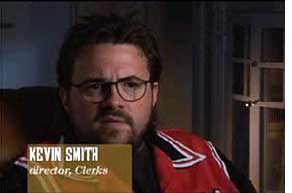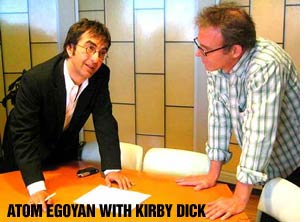
 |
||||||
|
GAY
FILM REVIEWS BY MICHAEL D. KLEMM
|
||||||
|
This Film Is Not Yet Rated IFC Films, 2006 Director: Screenplay: With: Unrated, 97 minutes
|
Society
Must Be Protected
This film is a couple years old, and I don't know what took me so long to get around to seeing it because it examines one of my biggest pet peeves involving the film industry - namely the MPAA Ratings Board and the double standards by which it rates the movies we see. Have you ever asked yourself how a film like But I'm A Cheerleader can get an NC-17 while torture porn like the Hostel movies get away with an R? This is the subject of Kirby Dick's documentary, aptly titled This Film Is Not Yet Rated. |
| I have ranted for years in my columns about the hypocrisy of the ratings board and how, back in the days when Blockbuster refused to carry unrated and NC-17 films, directors were often forced to butcher their work so that the biggest video chain in the country would rent it. (I'll list a few of my examples, from over the years, at the end of this review.) Dick is an Academy Award nominated documentary filmmaker (2004's Twist of Faith) whose newest film is a nice piece of investigative journalism, channeled through the Michael Moore school of astute, yet snotty, satire and irreverence. | |
|
|
|
 Interspersed
throughout, and providing a narrative arc, is footage involving a dynamic
lesbian duo of private detectives, Becky and Cheryl, hired by the director
to seek out and identify the secret members of the MPAA board. While providing
a bit of comic relief, these ladies also deliver the goods. A brief history
of film censorship is presented; from The Hays Code and the House Unamerican
Activities Committee up through the current ratings system. The MPAA's war
on piracy is also addressed and a climactic disclosure reveals that, ironically,
the MPAA breaks their own laws when they illegally copy This
Film Is Not Yet Rated when the director submits it for a
rating. Interspersed
throughout, and providing a narrative arc, is footage involving a dynamic
lesbian duo of private detectives, Becky and Cheryl, hired by the director
to seek out and identify the secret members of the MPAA board. While providing
a bit of comic relief, these ladies also deliver the goods. A brief history
of film censorship is presented; from The Hays Code and the House Unamerican
Activities Committee up through the current ratings system. The MPAA's war
on piracy is also addressed and a climactic disclosure reveals that, ironically,
the MPAA breaks their own laws when they illegally copy This
Film Is Not Yet Rated when the director submits it for a
rating. |
|
| This film is information overload. Much of what I always suspected turns out to be true. For example, the MPAA cooperates far more with big studio releases than they do with the small independents. South Park's Matt Stone talks about the MPAA refusing to divulge what they found offensive about an early independent he made and how, when doing the South Park movie for a big studio, they were supplied with a detailed list of the "suggested" cuts. | |
 All
of the talking heads have a horror story to recount. Kimberley Peirce, director
of Boys Don't Cry, is one of several filmmakers who suggest that
the MPAA upholds a straight male perspective when it comes to sex
- and is afraid to acknowledge feminine pleasure - because she, and several
others, have had their films slapped with an NC-17 because the camera lingered
for too long on a woman's face during the throes of orgasm. It is a sad
reality, but rape scenes are deemed more acceptable and are more likely
to be awarded the R rating instead of the dreaded NC-17. All
of the talking heads have a horror story to recount. Kimberley Peirce, director
of Boys Don't Cry, is one of several filmmakers who suggest that
the MPAA upholds a straight male perspective when it comes to sex
- and is afraid to acknowledge feminine pleasure - because she, and several
others, have had their films slapped with an NC-17 because the camera lingered
for too long on a woman's face during the throes of orgasm. It is a sad
reality, but rape scenes are deemed more acceptable and are more likely
to be awarded the R rating instead of the dreaded NC-17. |
|
 Jamie
Babbit, director of But I'm A Cheerleader, is furious that her film
(that she wanted teens in rural Wyoming to be able to see because
it exposed the dangers of sending gay kids to deprogramming camps) got an
NC-17 because of a fully clothed scene of a gay teen (unsuccessfully)
trying to pleasure herself - while American Pie's infantile apple
pie fornication scene not only gets an R but is even shown in the film's
trailer! Kevin Smith
remarks that sex talk earned Clerks an NC-17, Wayne Kramer
explains how his film, The Cooler, was done in by a few seconds of
pubic hair, and John Waters recounts how he asked what he had to cut in
order for A Dirty Shame to get an R and they told him that they stopped
taking notes after the first 20 minutes. Jamie
Babbit, director of But I'm A Cheerleader, is furious that her film
(that she wanted teens in rural Wyoming to be able to see because
it exposed the dangers of sending gay kids to deprogramming camps) got an
NC-17 because of a fully clothed scene of a gay teen (unsuccessfully)
trying to pleasure herself - while American Pie's infantile apple
pie fornication scene not only gets an R but is even shown in the film's
trailer! Kevin Smith
remarks that sex talk earned Clerks an NC-17, Wayne Kramer
explains how his film, The Cooler, was done in by a few seconds of
pubic hair, and John Waters recounts how he asked what he had to cut in
order for A Dirty Shame to get an R and they told him that they stopped
taking notes after the first 20 minutes. |
|
|
Two former MPAA members break silence and admit that the committee follows no clear set of standards, that everyone is far more concerned with sex than with violence, that there is no one with any background in child behavioral psychology, and that two priests are present at every screening. Big surprise - there is no one gay on the ratings board. |
|
|
There are a few good Michael Moore-ish cartoon sequences, the best being the one that explains the ratings. Some of the flip comments include G rated movies being able to have scenes of kicking ass but they can't show ass; a PG-13 movie can have one, and only one, utterance of the F word so please choose your profanity carefully; and R rated movies can't show sexual couplings in any position besides the missionary but we can see acts of extreme violence like this village of children being mowed down by an AK-47. |
|
 Throughout
it all, we see clips of NPAA president Jack Valenti speaking sanctimoniously
about the system's merits and making such blatantly false (or just plain
oblivious) statements - like claiming that ratings have no effect on box
office. A scary fact is pointed out, while "He's Got The Whole World In
His Hands" plays on the soundtrack, about how the major studios are all
part of six conglomerates that, together, own 90% of the media in the United
States. To his credit, Valenti was the one who proposed the ratings system,
in the late 60s, so that more adult films could get made in the first
place but somewhere along the way the mission got skewed. Newsweek's
David Ansen sums it up when he says that the ratings board is "supposed
to protect children, but it's turning us all into children." Throughout
it all, we see clips of NPAA president Jack Valenti speaking sanctimoniously
about the system's merits and making such blatantly false (or just plain
oblivious) statements - like claiming that ratings have no effect on box
office. A scary fact is pointed out, while "He's Got The Whole World In
His Hands" plays on the soundtrack, about how the major studios are all
part of six conglomerates that, together, own 90% of the media in the United
States. To his credit, Valenti was the one who proposed the ratings system,
in the late 60s, so that more adult films could get made in the first
place but somewhere along the way the mission got skewed. Newsweek's
David Ansen sums it up when he says that the ratings board is "supposed
to protect children, but it's turning us all into children." |
|
|
In closing, ponder this argument (no one, to my knowledge, has ever said this in print and so I will). What is the point of these ratings when any teenager can walk into a store and buy restricted movies once they are out on DVD? Ultimately, more people will see the film on DVD than they will in the movie theater. And, to make matters even worse, filmmakers will cut their films to get a lower rating for its theatrical run, and then release it on DVD as an unrated director's cut with all the offending footage restored - and so the NPAA's gallant efforts to protect our children backfire spectacularly when a child can walk into Target and buy the unrated version, with more gore, of Hostel II. Think about it. More On Kirby
Dick:
|
|
|
Here's a few examples from some of my older reviews....
|